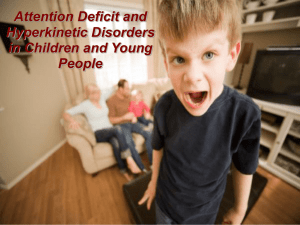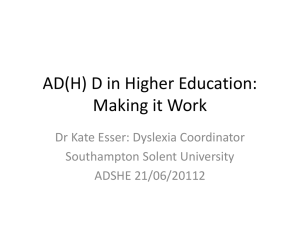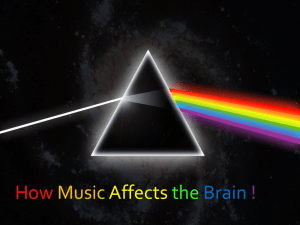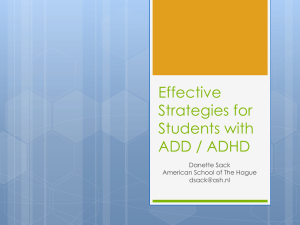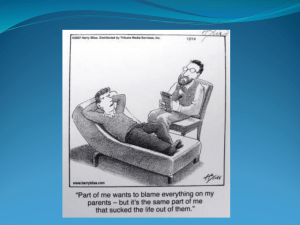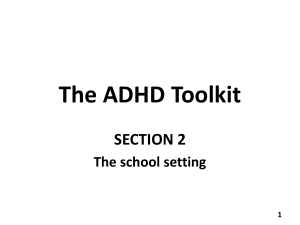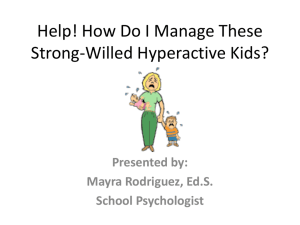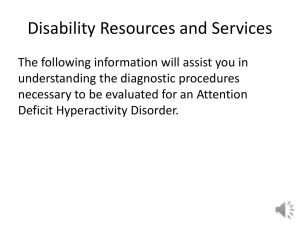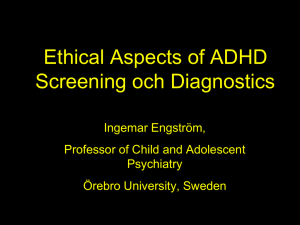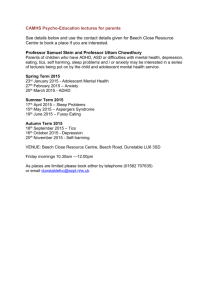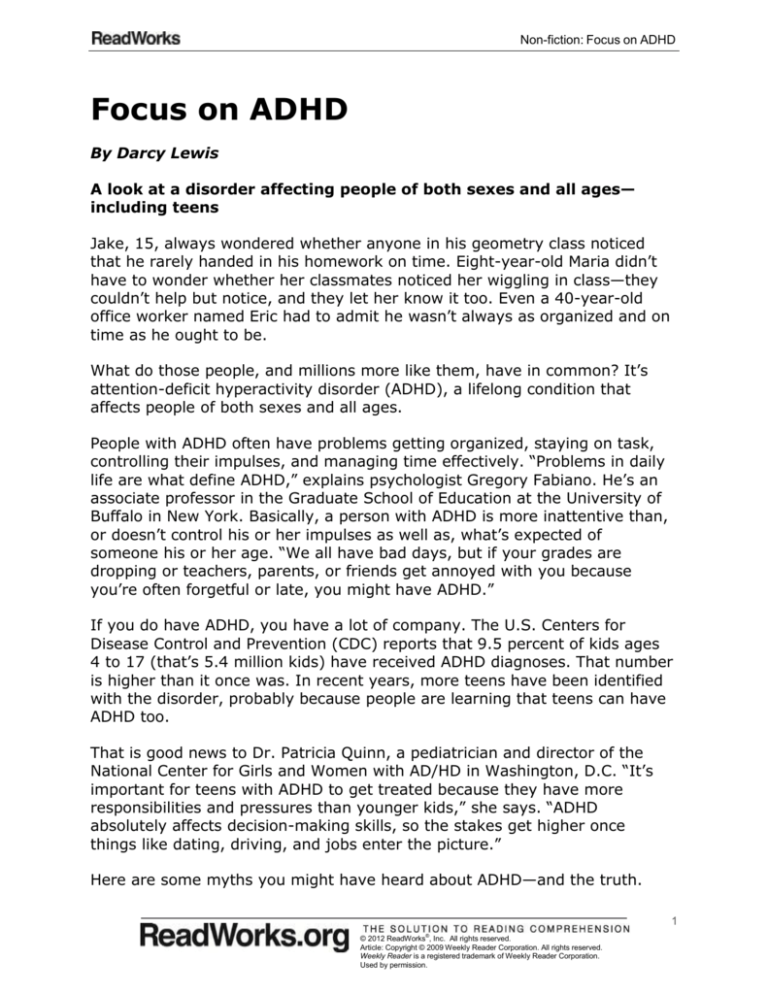
Non-fiction: Focus on ADHD
Focus on ADHD
By Darcy Lewis
A look at a disorder affecting people of both sexes and all ages—
including teens
Jake, 15, always wondered whether anyone in his geometry class noticed
that he rarely handed in his homework on time. Eight-year-old Maria didn’t
have to wonder whether her classmates noticed her wiggling in class—they
couldn’t help but notice, and they let her know it too. Even a 40-year-old
office worker named Eric had to admit he wasn’t always as organized and on
time as he ought to be.
What do those people, and millions more like them, have in common? It’s
attention-deficit hyperactivity disorder (ADHD), a lifelong condition that
affects people of both sexes and all ages.
People with ADHD often have problems getting organized, staying on task,
controlling their impulses, and managing time effectively. “Problems in daily
life are what define ADHD,” explains psychologist Gregory Fabiano. He’s an
associate professor in the Graduate School of Education at the University of
Buffalo in New York. Basically, a person with ADHD is more inattentive than,
or doesn’t control his or her impulses as well as, what’s expected of
someone his or her age. “We all have bad days, but if your grades are
dropping or teachers, parents, or friends get annoyed with you because
you’re often forgetful or late, you might have ADHD.”
If you do have ADHD, you have a lot of company. The U.S. Centers for
Disease Control and Prevention (CDC) reports that 9.5 percent of kids ages
4 to 17 (that’s 5.4 million kids) have received ADHD diagnoses. That number
is higher than it once was. In recent years, more teens have been identified
with the disorder, probably because people are learning that teens can have
ADHD too.
That is good news to Dr. Patricia Quinn, a pediatrician and director of the
National Center for Girls and Women with AD/HD in Washington, D.C. “It’s
important for teens with ADHD to get treated because they have more
responsibilities and pressures than younger kids,” she says. “ADHD
absolutely affects decision-making skills, so the stakes get higher once
things like dating, driving, and jobs enter the picture.”
Here are some myths you might have heard about ADHD—and the truth.
1
© 2012 ReadWorks®, Inc. All rights reserved.
Article: Copyright © 2009 Weekly Reader Corporation. All rights reserved.
Weekly Reader is a registered trademark of Weekly Reader Corporation.
Used by permission.
Non-fiction: Focus on ADHD
Myth: If you’re not hyper, you don’t have ADHD.
Sure, some people fit the ADHD stereotype of being a nonstop bundle of
energy with a mile-a-minute mouth. They tend to stand out when their
constant motion becomes disruptive. But other people have the inattentive
form of ADHD, which means that their challenges are likely to include being
organized, not becoming easily distracted, and controlling impulses, not
hyperactivity.
Myth: Girls don’t have ADHD.
Quinn hears that a lot, even though the CDC found that 5.6 percent of girls
have received an ADHD diagnosis. Instead of being hyperactive, which is
hard for teachers and parents to miss, “girls tend to be inattentive, so they
can get overlooked,” she explains. “They also have more depression and
anxiety from figuring out ways to compensate.”
Gender differences in the way boys and girls respond to symptoms—and try
to make up for them—can also contribute to the perception that girls aren’t
often affected by ADHD.
Myth: Smart kids don’t have ADHD.
Kayte Pietrick, a 20-year-old from Winnetka, Ill., used to think she wasn’t
smart because of her ADHD. “I didn’t do well in school and was in a lowerlevel math class,” she says. “But I finally learned how to work with my ADHD
in high school and graduated with honors. Now I know I’m just as smart as
anyone else.”
Experts believe that being smart and having ADHD means you’re more likely
to figure out coping strategies on your own, at least for a while. That’s what
15-year-old Conor M. of Virginia did. “I’m pretty smart, so I could skate by
until middle school, when it got harder to stay organized,” he explains.
“Then things went downhill even more in freshman year, which is when I got
my ADHD diagnosis.”
Myth: People who have ADHD don’t really need medication for it.
As ADHD has become more widely diagnosed, some parents and teachers
have worried that medications such as methylphenidate (also known by its
brand names, which include Ritalin) are prescribed too often. Or they believe
that ADHD can be controlled simply by trying harder. But ADHD, like other
disorders, is serious and should be treated. “Many types of ADHD treatments
have been tried,” says Fabiano. “But only two have been shown to work:
medication and behavior modification,” which is learning new ways of doing
things. “Most people get the best results when they do both,” he adds.
2
© 2012 ReadWorks®, Inc. All rights reserved.
Article: Copyright © 2009 Weekly Reader Corporation. All rights reserved.
Weekly Reader is a registered trademark of Weekly Reader Corporation.
Used by permission.
Non-fiction: Focus on ADHD
Myth: Having ADHD means a person won’t find success in life.
The Internet is full of lists of celebrity entertainers, billionaires, and
scientists who learned to deal with ADHD on the way to huge successes. If
you’re one of the millions of teens with ADHD, you could one day make the
list too! “ADHD does not need to limit anyone’s possibilities in life, but
people do need to learn to manage it instead of letting it manage them,”
says Quinn.
That means figuring out your strengths and adapting as needed. “ADHD is a
lifelong condition, so it can be a game of Whac-A-Mole—as soon as you get
one issue under control, another pops up,” Fabiano says. “But when you
really understand what you do well, you can figure out new solutions that
will take you where you want to be.”
Inside
Three young people share what ADHD is really like.
“I have a lot of impulsivity and am really talkative but try to turn it down.
Some people are pretty tolerant, but others get kind of harsh about it. So I
try to be as calm as I can, but it’s hard.”
—Conor M., 15, Virginia
“Concentrating is hard because there’s always a million things going through
my head. I can’t seem to keep anything in my brain for more than a few
seconds before it slips away, but I’m used to it now.”
—Carson B., 17, North Carolina
“Kids with ADHD see many different ways to learn and solve problems. If I
didn’t have ADHD, I probably wouldn’t be nearly as creative as I am today.”
—Kayte Pietrick, 20, Illinois
What Should I Do?
Diagnosing ADHD is not a do-it-yourself project. If you think you may have
ADHD, ask your parents to make an appointment with your doctor or a
psychologist who is knowledgeable about ADHD. You can also ask a teacher
or a counselor for advice. “Find a trusted adult, and persist until you have
been heard,” says Dr. Patricia Quinn, a pediatrician. “Don’t dismiss your
suspicions. You deserve the help.”
3
© 2012 ReadWorks®, Inc. All rights reserved.
Article: Copyright © 2009 Weekly Reader Corporation. All rights reserved.
Weekly Reader is a registered trademark of Weekly Reader Corporation.
Used by permission.
Questions: Focus on ADHD
Name:
Date:
1. People with ADHD often have problems with all of the following EXCEPT
A
B
C
D
getting organized
staying on task
controlling impulses
being too focused
2. This passage includes a list of myths about ADHD. What do all of the examples in the
list have in common?
A
B
C
D
The
The
The
The
examples
examples
examples
examples
describe why the myths are mostly true.
dispel each false myth with the truth.
explain how some of the myths are true.
tell why each myth contains a nugget of truth.
3. After reading the passage, what can you conclude about ADHD?
A
B
C
D
Exercise could have prevented most people from getting ADHD.
An ADHD diagnosis can help people with the disorder get help.
Teenagers with ADHD are hyperactive and disruptive in school.
ADHD can be completely cured with the right medications.
4. Read these sentences from the passage: “Instead of being hyperactive, which is hard
for teachers and parents to miss, ‘girls tend to be inattentive, so they can get overlooked,’
she explains. ‘They also have more depression and anxiety from figuring out ways to
compensate.’”
In this sentence, the word compensate means
A
B
C
D
to
to
to
to
offset one’s shortcomings
flaunt a new skill or talent
continue in a downward spiral
increase one’s earnings
5. Which statement best describes the main idea of the passage?
A
B
C
D
Dr. Patricia Quinn is a pediatrician and expert on teenagers with ADHD.
ADHD is a lifelong condition that affects people of both sexes and all ages.
Many celebrity entertainers have learned to deal with ADHD and succeed.
The CDC found that 5.6 percent of girls have received an ADHD diagnosis.
1
®
© 2012 ReadWorks , Inc. All rights reserved.
Questions: Focus on ADHD
6. According to the CDC report, how many kids ages 4 to 17 have received ADHD
diagnoses?
7. How might 15-year-old Conor M. of Virginia have felt when he got diagnosed with
ADHD? Please cite evidence from the text to support your answer.
8. The question below is an incomplete sentence. Choose the word that best completes
the sentence.
Kayte Pietrick ended up graduating high school with honors
work with her ADHD.
A
B
C
D
she learned how to
or
after
until
finally
2
®
© 2012 ReadWorks , Inc. All rights reserved.
Questions: Focus on ADHD
9. Answer the following questions based on the sentence below.
Because they are often forgetful or late, teens with ADHD might notice people getting
annoyed with them.
Who? teens with ADHD
(might do) What?
Why?
10. Vocabulary Word: modification: a change made.
Use the vocabulary word in a sentence:
3
®
© 2012 ReadWorks , Inc. All rights reserved.
Teacher Guide & Answers: Focus on ADHD
4
© 2012 ReadWorks®, Inc. All rights reserved.

